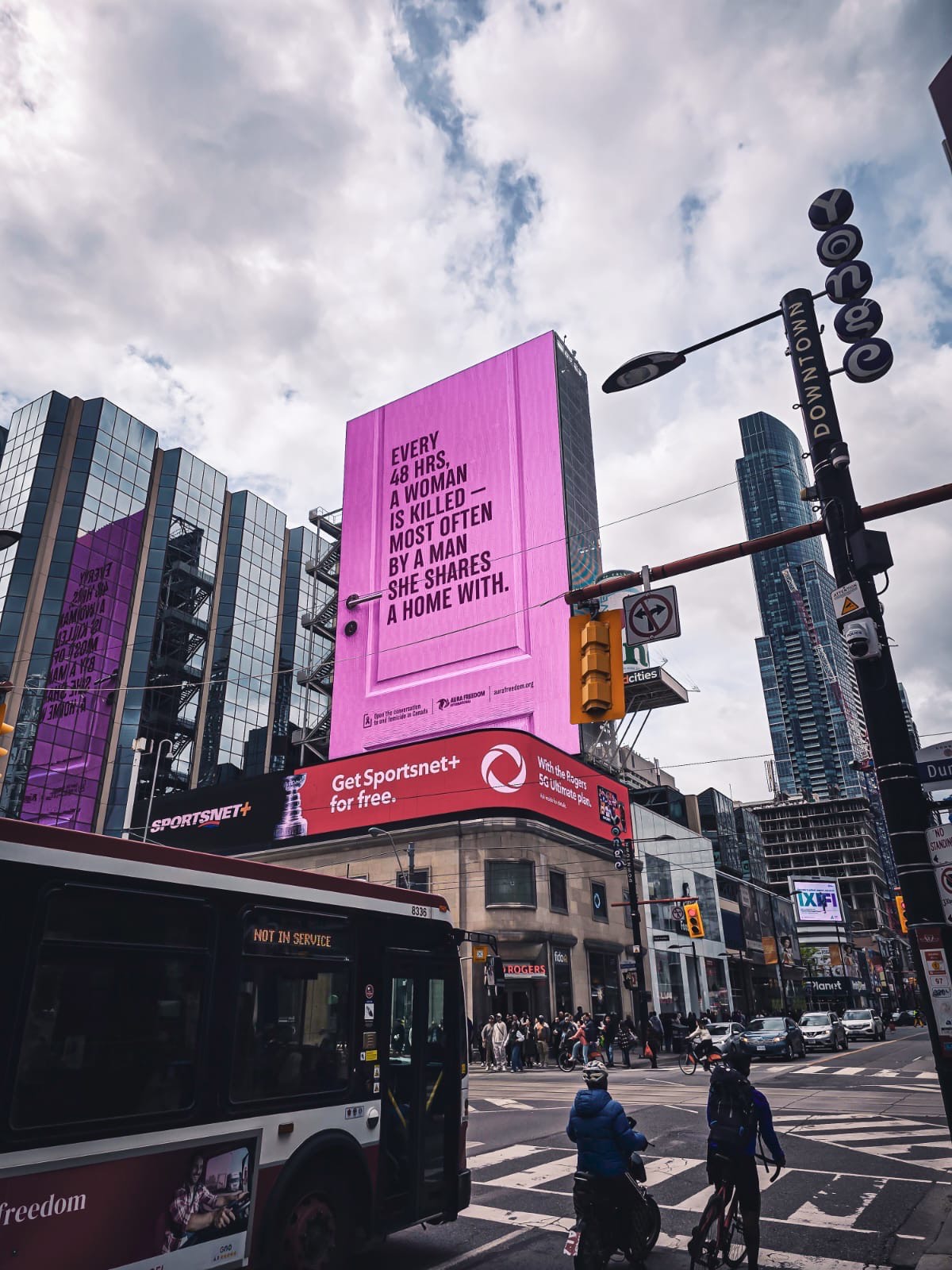Ihorror movies, women often face danger on dark streets and dimly lit garages. They escape from the unknown attackers and run to safety. They hastily slam the doors and lock them before breathing a sigh of relief at being safe inside.
In these stories, home can become a refuge for women and girls. Locked doors provide protection from the outside world – all those dark alleys and dangerous strangers. Real statistics, on the contrary, paint a completely different picture.
In Canada in 2025, behind closed doors is one of the deadliest places a woman can be.
Intimate partner violence and femicide in Canada
Every 48 hours a woman is killed in Canada. In almost 80% of cases, the perpetrator is not a stranger or a serial killer, but a man with whom she should be safe: a boyfriend, husband, brother, uncle, father or son. For these women and girls, home is not a refuge; 77% are killed in private places, such as their own home or the home they share with the accused.
The intentional killing of women or girls because of their sex or gender identity is called femicide. Marissa Kokkoros, executive director of Aura Freedom International, says many would rather avoid the topic. “There is no good way to talk about murder,” she admits, but says the urgency of our current crisis requires tough conversations. “Nearly 50% of women in Canada have experienced at least one form of intimate partner violence… This is worthy of our attention.”
Aura Freedom is a women-led and survivor-led organization dedicated to ending male violence against women. However, despite more than a decade of efforts and advocacy, Kokkoros says the situation for women in Canada is not getting better and may even be getting worse: from 2019 to 2022, the number of women and girls killed by men increased by 27%.
As we approach 16 days of action against gender-based violence, Aura Freedom is sounding the alarm and calling on Canadians to recognize femicide for what it is: “a crisis, an emergency and a violation of human rights, and not something private that remains behind closed doors.”
Myths and misogyny
Kokkoros says reducing intimate partner violence and femicide requires investing in prevention to stop what she calls the “revolving door of frontline services.” To paraphrase Desmond Tutu, she explains: “We're constantly pulling people out of the river instead of going upstream to find out why they're falling.”
Facts about femicide in Canada
Every 48 hoursin Canada, a woman is killed – most often by the man with whom she lives in the same house.
44% women and girls in Canada report having experienced at least one form of intimate partner violence, which was defined as femicide rate.
From 2019 to 2022, number of women and girls killed by men increased by 27%.
Intimate partner and familial femicide are the most common forms of femicide in Canada. In 2024 77.5% victims were killed by their husbands, boyfriends, fathers, sons, brothers, uncles and other men with whom they should have been the safest.
According to the final report of the MMIWG National Inquiry, Indigenous women and girls twelve times more likely more likely to be killed than any other woman in Canada.
She believes the rise in men's violence against women is partly due to rising misogyny and aggressive resistance to feminism. At the macro level, Kokkoros sees these themes playing out in ideas of the “manosphere” permeating mainstream media and restrictions on women's reproductive rights, and at the micro level in the homes of women and girls, and in their relationships with male partners, family members, colleagues, classmates, and friends.
Misogyny is defined as hatred of women, and it is not difficult to find examples of this ideology in action online. With just a few clicks, you can find violent pornography that degrades women and girls and even normalizes their violence and subjugation. Major platforms such as TikTok, Instagram and YouTube offer a virtually limitless library of content reflecting anti-feminist and anti-women sentiments that portray women as the enemy, blame them for men's problems and encourage violence against them.
In these spaces, feminism is deliberately misrepresented and mislabeled as misandry, man-hatred. However, feminist ideology argues that all genders should have equal rights, freedoms and opportunities. Intersectional feminism also seeks to dismantle all forms of oppression, including colonialism and systemic racism. Simply put, feminism strives for equality, not dominance—freedom instead of control.
Recognizing that misogyny leads to violence by men is vital to debunking common misconceptions and understanding why femicide needs to be identified as a distinct form of violence.
“When you are born with the idea that someone is less valuable than you and inferior to you, it validates and justifies you to mistreat them, abuse them, control them, and dominate them,” Kokkoros explains. “Women are killed very differently than men. In most cases it comes down to power and control and intimate or family relationships… It's not that strange stranger in the alley.”
Kokkoros hopes that opening the door to conversations about femicide will attract more men as advocates and allies and encourage them to take part in efforts to prevent gender-based violence and end misogyny.
“There are a lot of wonderful men who care about this,” she says. “But it's not enough to say, 'Hey, I don't abuse my partner or I respect my daughter.'
Three ways to act
Tie a purple ribbon to your front or office door during 16 Days of Action against Gender-Based Violence (November 25 to December 10) to show your support for ending femicide in Canada. Tag @aurafreedom and #BehindClosedDoors to share a photo of your door.

Learn more about femicide and help spread the word by visiting and sharing information on the Aura Freedom website. Behind closed doors campaign

Donate Aura Freedom's work to end femicide and violence against women.
Overrepresentation of Indigenous women
Intimate partner violence can affect women from all walks of life. However, in Canada, Indigenous women and girls face a much higher risk, which Kokkoros calls “Canada's greatest shame.” Indigenous women in Canada are three and a half times more likely to experience spousal violence than non-Indigenous women, and Indigenous women and girls are twelve times more likely to be murdered.
Indigenous organizations and communities across Canada are leading efforts to address the Missing and Murdered Indigenous Women and Girls (MMWIG) crisis, guided by the “231 Calls for Justice” outlined in Reclaiming Power and Place: The Final Report of the National Inquiry into Missing and Murdered Indigenous Women and Girls.
Aura Freedom is partnering with the Toronto Indigenous Women's Resource Center to create resources and disseminate information while actively increasing Indigenous-led advocacy to quickly implement all 231 calls for justice.
Ending gender-based violence
Along with other women-focused feminist organizations such as the Canadian Observatory on Femicide Justice and Accountability, Aura Freedom works to combat intimate partner violence and femicide through education, advocacy and campaigns such as Behind Closed Doors.
Behind Closed Doors is an awareness campaign launched in May 2025 when Aura Freedom partnered with Doors Open Toronto to install bright pink doors in front of Toronto City Hall, raising awareness of the femicide crisis. Pink Doors will return to several locations, including Toronto City Hall, during 16 days of action against gender-based violence, from November 25 to December 10.

Aura Freedom hopes the campaign will stimulate discussions about femicide and, by intentionally using bright pink doors, will draw attention to the role gender plays in these killings. “We will gender everything except femicide,” says Kokkoros.
The use of the term “femicide” makes a critical distinction based on the motivation of the accused, similar to how hate crime legislation defines actions based on factors such as race, religion or sexual orientation.
“It's about how and why women are killed,” Kokkoros says. “They're being killed because they're women. … It's not a crime of passion. It's not someone else's danger. … It's about violence, sexism, gender inequality, misogyny, patriarchy, systemic racism. That's what we're talking about here, and that's why we need to name it in the Criminal Code.”

To date, twenty-nine countries have passed laws regarding femicide, including Mexico, France, Spain and Brazil. Aura Freedom calls on the Government of Canada to study this issue, evaluate the approach taken by other countries, and decide whether Canada will join those other governments in recognizing femicide as a distinct form of gender-based violence.
Kokkoros says by doing so, the Canadian government can make significant strides in saving lives and preventing the far-reaching ripple effects of femicide.
“When we hurt women, we all lose,” she says. “It's not because women are more important, but because in most cultures women are the backbone of their families, their communities, their society. So when you break her, you break everyone she carries on her back… If we eradicate violence against women, we will see our communities begin to thrive.”
Visit aurafreedom.org to find out more.








